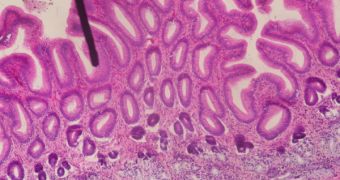The stomach is essential to processing food in all living creatures, and everything has some form of stomach or another, even bacteria and microbes. In order for the human version to work, it needs to produce hydrochloric acid (HCL), a substance that helps break down the food into smaller components. Thus far, the gene responsible for producing a vital element of the acid – chloride – was unknown, but now scientists at the University of Cincinnati managed to identify it.
The UC team found that the transporting gene Slc26a9 is responsible for regulating the production of HCL in animal models, namely idle mice (Mus Musculus). When the gene was stopped and inhibited, the animals showed no more signs of chloride production, which meant that the hydrogen generated by other genes had no other substance to bind with, in order to form the acid.
"Investigators were already aware of the gene that caused hydrogen to secrete in the stomach, but the gene that caused chloride to secrete has remained an unknown. When we knocked out – or eliminated – this specific transporter in mouse models, acid secretion in the stomach completely halted," explained Manoocher Soleimani, MD, director at UC's Nephrology Division and the leader of the current research. He went on to add that "The hydrogen and chloride genes must work together in order for the stomach to produce acid and function normally."
The study argues that understanding the precise way in which this transporter molecule works could hold the key to preventing or treating diseases such as peptic ulcer and acid reflux, which currently affect hundreds of thousands of people worldwide. In peptic ulcer, excess acid is dumped into the intestines, while, in the case of acid reflux, the acid reaches the esophagus and can cause burns.
"With this information, we hope to one day be able to administer gene therapies to patients and avoid this painful and damaging problem altogether," Soleimani added, in regard to the two very unpleasant afflictions.

 14 DAY TRIAL //
14 DAY TRIAL //